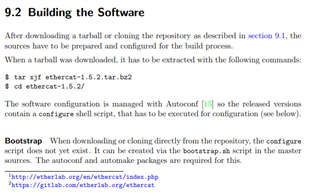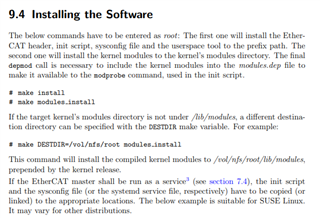Tool/software:
Hi experts,
I followed these steps which is there in ti page
https://software-dl.ti.com/processor-sdk-linux-rt/esd/AM62PX/10_00_07_04/exports/docs/linux/Foundational_Components_Kernel_Users_Guide.html#id19
i followed the kernel image and kernel modules installation.
current kernel
Linux am62pxx-evm 6.6.32-rt32-g04a9ad081f0f-dirty #1 SMP PREEMPT_RT Tue Oct 29 16:47:42 IST 2024 aarch64 GNU/Linux
I thing we are missing the linux headers for this kernel version.
But what i tried is, copied the old linux header(linux-headers-6.6.32-k3-rt) to updated kernel name in /usr/src
linux-headers-6.6.32-rt32-g04a9ad081f0f-dirty
Can you please help us to build ethercat with these this is our last blocker from the target
error while building the ethercat
[64316.553416] ec_master: version magic '6.6.32-k3-rt SMP preempt_rt mod_unload aarch64' should be '6.6.32-rt32-g04a9ad081f0f-dirty SMP preempt_rt mod_unload aarch64' ------error from ethercat installation------ ERROR: could not insert 'ec_master': Exec format error failed
we rebuild the ethercat and its successfully rebuild and ethercat.ko file also created but the problem is since I deleted the lib/modules for old kernel and paste the new kernel modules. while building ethercat it automatically creating the folder of old kernel name and pasting the ethercat folder into it. so after that i manually copy that folder inside the new kernel but even if its not working.
Let me tell you one thing we not giving any path where to install ethercat but i should automatically take the current kernel.
Can you tell me the steps where i can build the kernel image with same old kernel name or if anything else.
I am thing there are even if some dependencies are there with the old kernel and new.
One last thing to add on we are using the same old linux-header(/usr/src/linux**) while ethercat install its taking the old header and building it.
This is the previous thread for some information why we build kernel.(+) SK-AM62P-LP: Error while docker run - Processors forum - Processors - TI E2E support forums
Regards,
Debashis



